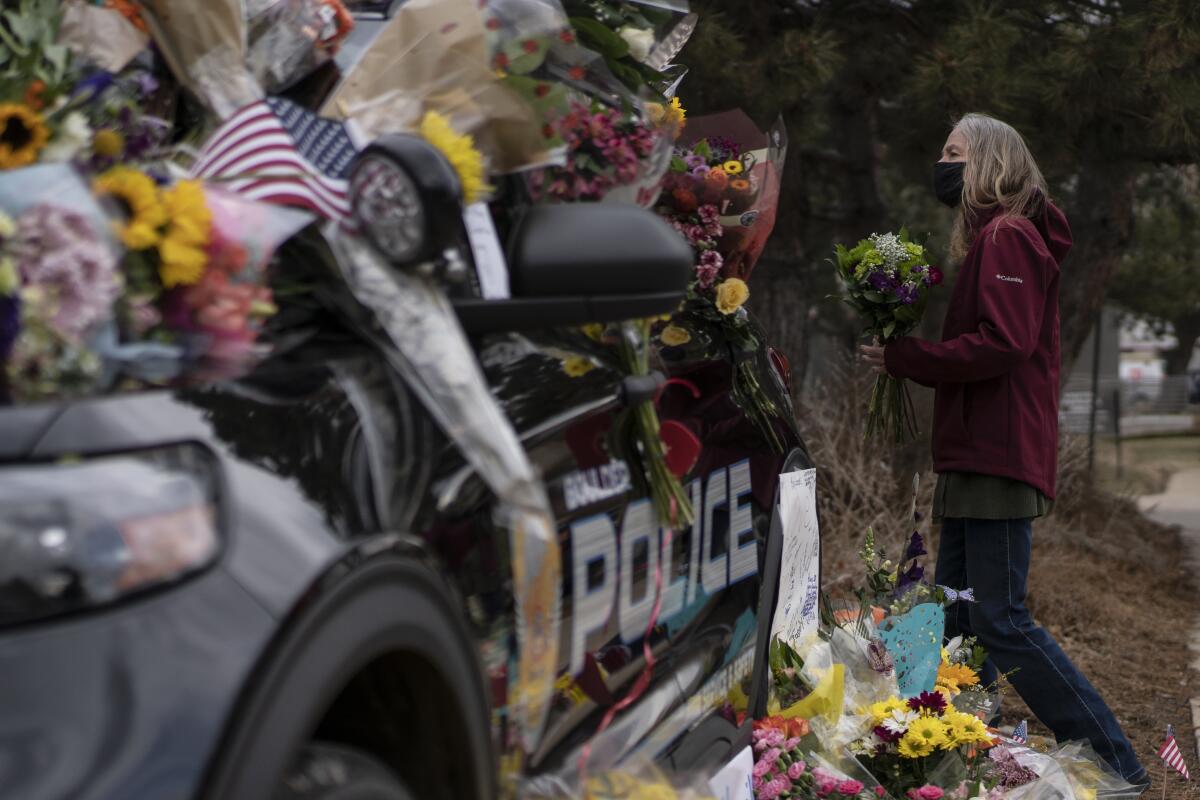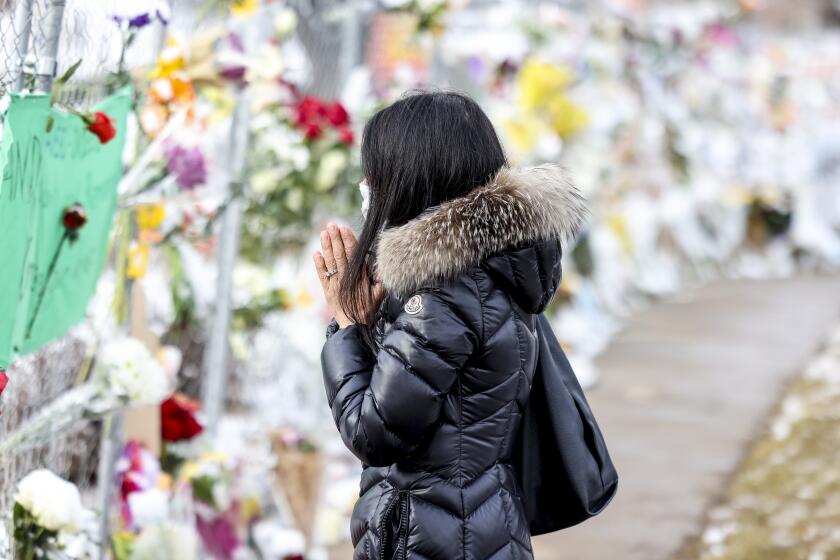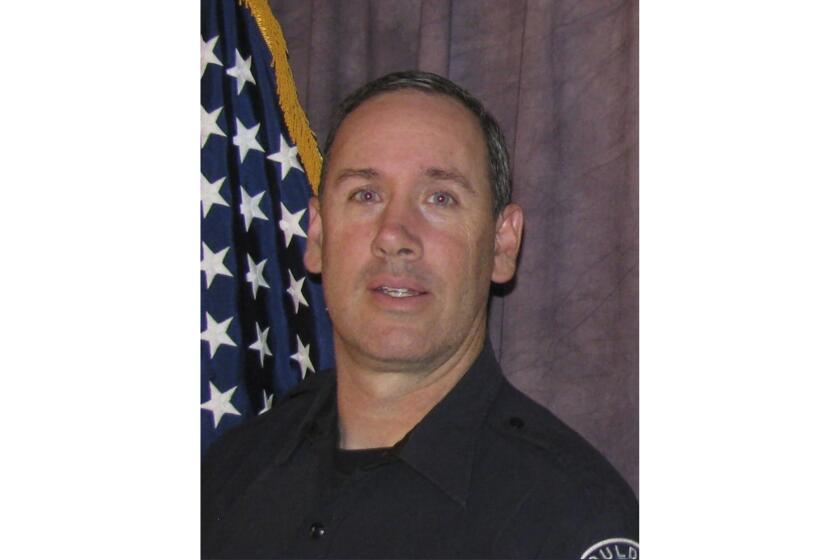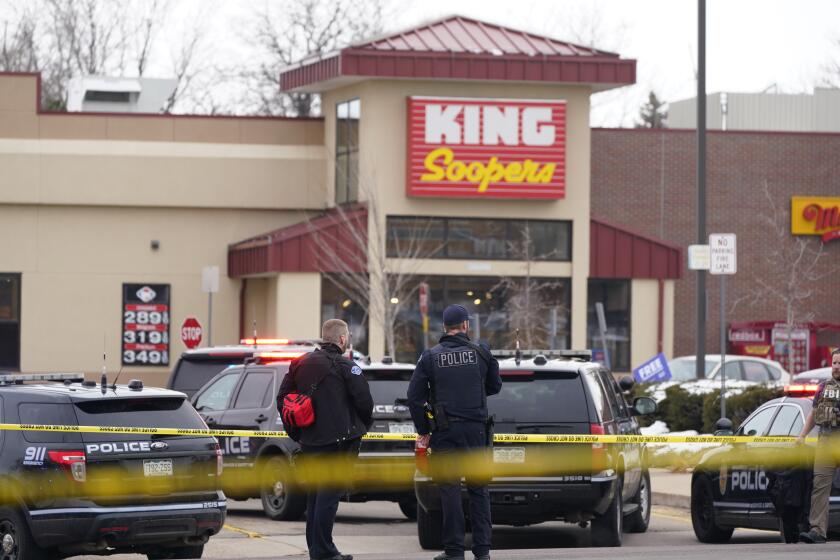Suspect in Boulder mass shooting had a history of angry outbursts and an assault conviction

BOULDER, Colo. — The 21-year-old accused of killing 10 people at a supermarket here had a history of angry outbursts — including a conviction for violently attacking a high school classmate — and told relatives that he believed he was “being chased” by people who were out to get him.
A day after the shooting massacre, authorities offered few clues about what may have motivated Ahmad Al Aliwi Alissa, who was charged Tuesday with 10 counts of murder.
The dead ranged in age from 20 to 65 and included a grocery bagger, an Instacart shopper, an actress-turned-financial counselor for the poor and a police officer who was the first to respond to reports of shots fired Monday afternoon at the King Soopers grocery store.
“My heart aches for their loved ones,” Gov. Jared Polis said.
A shooting at a Colorado supermarket Monday killed 10 people, including a police officer, and a suspect was in custody, authorities said.
The killings, which came less than a week after shootings in the Atlanta area that left eight people dead, quickly became a catalyst for renewed calls for gun control.
President Biden said Congress should not “wait another minute” to ban high-capacity ammunition magazines and assault rifles. “This is not and should not be a partisan issue — it is an American issue. We have to act.”
Earlier this month, a judge blocked a 2018 ban on assault rifles passed by the city of Boulder in response to the mass shooting at Marjory Stoneman Douglas High School in Parkland, Fla., that resulted in 17 deaths.
In the arrest affidavit released Tuesday, authorities said that Alissa purchased his high-powered weapon — a Ruger AR-556, which is considered a “budget version” of the better-known AR-15 and can fire 30 rounds in under 10 seconds — six days before the massacre. He was also armed with a semiautomatic handgun.
Alissa, who was born in Syria but grew up in Colorado and wrestled for Arvada West High School, where he graduated in 2018, had a reputation for behavior so erratic that some relatives believed he was mentally ill.
“When he was having lunch with my sister in a restaurant, he said, ‘People are in the parking lot, they are looking for me,’’’ his 34-year-old brother, Ali Aliwi Alissa, told the Daily Beast. “She went out, and there was no one. We didn’t know what was going on in his head.”
The 10 people who were gunned down included a magazine photographer, a Medicare agent with a passion for theater and others going about their days at a busy shopping plaza.
The killings, the brother said, were “not at all a political statement, it’s mental illness.”
“The guy used to get bullied a lot in high school. He was like an outgoing kid, but after he went to high school and got bullied a lot, he started becoming antisocial.”
In 2017, police arrested Alissa after he assaulted a high school classmate, according to Colorado Bureau of Investigation records obtained by The Times.
An affidavit in the case said Alissa attacked the boy at random, kicking him to the ground, then punching him.
The classmate, who suffered cuts and bruises on his head, “had made fun of him and called him racial names weeks earlier,” according to Alissa, who pleaded guilty to misdemeanor assault and was sentenced to probation and community service.
Tyson Crosby, who said his son wrestled against Alissa at the high school, described him as once a “nice kid” but who also had bursts of “anger” and “frustration,” especially if he lost a match.
A 21-year-old man is in custody on suspicion of fatally shooting 10 people at a Boulder, Colo., grocery store.
Dayton Marvel, a former wrestling teammate, told the Denver Post that Alissa once, during tryouts for varsity, “actually lost his match and quit the team and yelled out in the wrestling room that he was, like, going to kill everybody.”
“Nobody believed him,” Marvel said. “We were just all kind of freaked out by it, but nobody did anything about it.”
But Keaton Hyatt, who took a weight-training class with Alissa when they were classmates in high school, recalled him as kind, funny and mostly quiet.
“I never heard him threaten anyone,” he said. “I was shocked when I heard the news this morning. He fit in with everybody and had his circle of friends.”
Facebook and Instagram accounts that appeared to belong to Alissa — but were taken down after his name was released — channeled his apparent frustrations.
“Just curious what are the laws about phone privacy because I believe,” he posted on Facebook in early 2019. “My old school (a west) was hacking my phone. Anyone know if I can do anything through the law?”
“#NeedAGirlfriend,” he posted later that year.
His Facebook profile said he was studying computer science at the Metropolitan State University of Denver, but the school released a statement that he was “not nor has he ever been an MSU Denver student.”
By Monday evening, people were calling him a mass killer.
“We saw the face of evil,” the governor said after officers escorted Alissa, who was shirtless and wearing shorts, away from the grocery store in handcuffs, blood running down his right leg.
Authorities said he was wounded in a shootout with police before laying down his weapons, then treated at a hospital before being booked into the county jail.
The arrest affidavit said that Alissa lived in suburban Arvada, just west of Denver. Law enforcement surrounded the home Monday night and stopped a woman who tried to leave in a pickup.
The woman, who told police that she was Alissa’s sister-in-law and lived there too, described an incident that had occurred two days earlier.
“She was … hesitant to mention it, but stated that Alissa was seen playing with a gun she thought looked like a ‘machine gun,’” a detective wrote in the arrest affidavit. “Alissa had been talking about having a bullet stuck in the gun, and was playing with the gun.”
She said another relative was “upset with Alissa for playing with the gun in the house, and took the gun.”
Neighbors said Tuesday that the family had moved to the five-bedroom house in the last 18 months and that multiple generations resided there. Three cars were parked in the driveway and the curtains were drawn as news reporters gathered outside. Knocks on the front door went unanswered.
Steve Weber, a neighbor who moved to the subdivision 17 years ago, said he regularly saw “someone who looks like the shooter” come and go from the home.
Weber said that he wondered how such a crime came to be and that he mourned the victims.
Police Officer Eric Talley, 51, was the father of seven. In 2013, the local newspaper published an article about Talley and two other officers wading into a drainage ditch to save a family of ducklings.
Denny Stong, 20; Rikki Olds, 25; and Teri Leiker, 51, worked at the store.
“Denny was not just a victim, but a hero who guided people out of the store through the back and was leading people to safety before losing his life,” a childhood friend wrote on a GoFundMe Page to support Stong’s family.
The Facebook page for Olds is full of photos of the Colorado mountains, lakes and forests. Her partner, Jordan Arthur, posted a picture of the two of them this week and a message: “Rikki baby, you were taken too soon. I miss you dearly.”
The victims who did not work at the store were Neven Stanisic, 23; Tralona Bartkowiak, 49; Suzanne Fountain, 59; Kevin Mahoney, 61; Lynn Murray, 62; and Jodi Waters, 65.
Stanisic was described as a mild-mannered man of Christian faith who came from a family who fled war in the former Yugoslavia. Bartkowiak managed Umba, a Boulder store specializing in yoga and festival clothing. Fountain was an actress and financial advisor and known among neighbors for her home garden.
Mahoney, who once worked in hotel asset management, was mourned by his pregnant daughter, whom he walked down the aisle last summer for her wedding. Murray was a retired photo director who had worked for Glamour, Marie Claire and Cosmopolitan. Waters, remembered by her friends for her stylish fashion, worked in and owned boutiques on Boulder’s Pearl Street Mall.
Those who lived by the house and near the grocery store said they had become accustomed to violence. The Denver suburbs have become synonymous with high-profile shootings, starting in 1999 with the Columbine High School massacre in Littleton.
Outside the King Soopers store, pro-gun reform signs, such as “Moms Demand Action,” were taped to fencing above a makeshift memorial of flowers and candles for victims.
Just down the street, Lisa Hanckel was at home trying to come to terms with the violence. An acupuncturist and yoga therapist who has lived in the neighborhood for 24 years, she frequented the grocery store and knew several of the victims.
“I’m traumatized, yet I’m not any more traumatized than I was after Sandy Hook or any other shooting,” she said. “I was a classroom teacher when Columbine happened. This has been going on way too long. What are we going to do?”
Kaleem reported from Boulder, Read from Seattle and Etehad from Los Angeles. Times staff writer Jenny Jarvie in Atlanta and special correspondent David Kelly in Boulder contributed to this report.
More to Read
Sign up for Essential California
The most important California stories and recommendations in your inbox every morning.
You may occasionally receive promotional content from the Los Angeles Times.
















